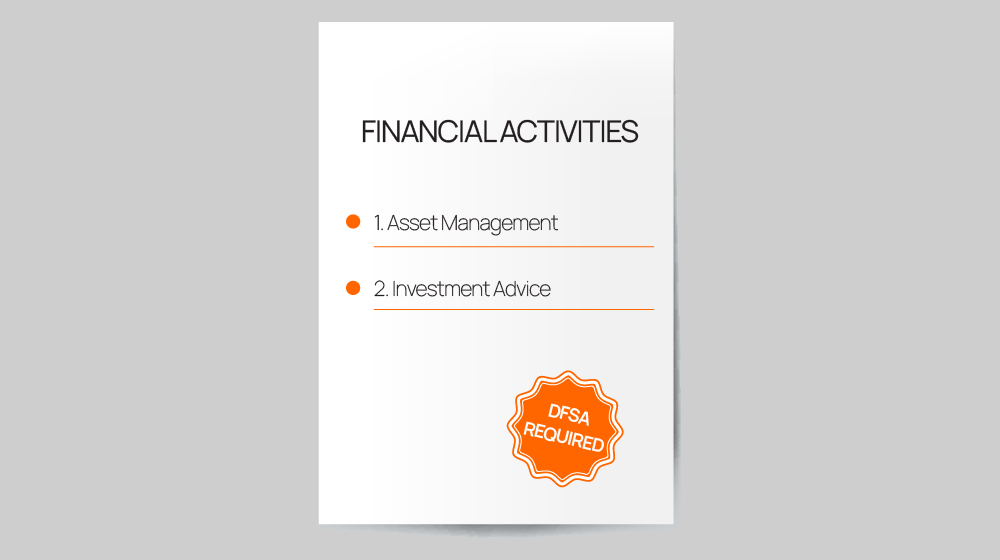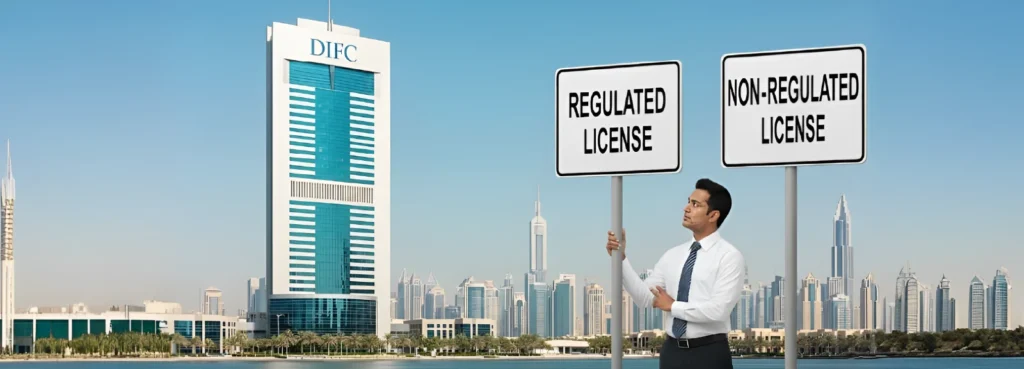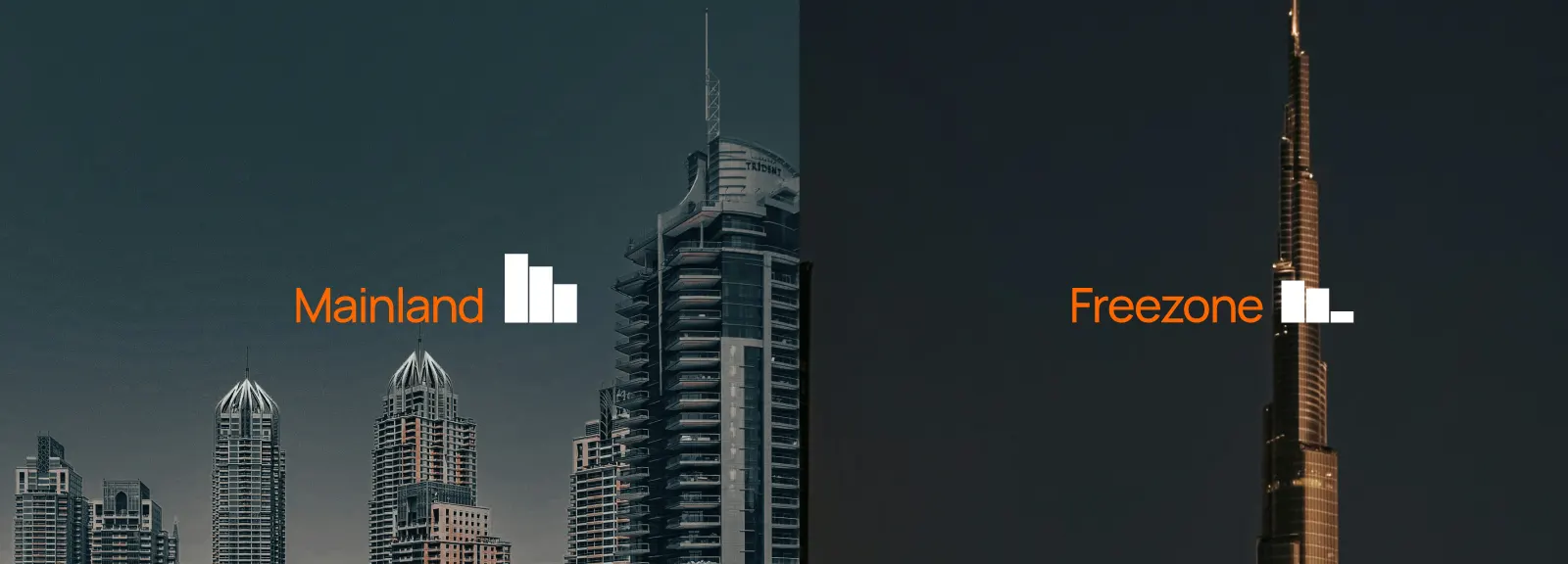Setting up a company in the Dubai International Financial Centre (DIFC) opens the door to one of the most trusted, business-friendly financial hubs in the world. But before you can begin operations, there is one critical decision that will affect every aspect of your setup, compliance, and long-term viability: choosing the right DIFC license.
A DIFC license is not just a legal formality. It defines what you are allowed to do, the authorities you need to deal with, and the level of regulatory oversight you’ll be subjected to. If you pick the wrong one, you risk unnecessary delays, higher costs, and possible compliance issues down the road.
In this blog, we will walk through everything you need to know about DIFC licenses. Whether you’re a fund manager, fintech founder, family office, or advisor, this guide will help you make an informed decision.
Table of Contents
The Two Paths: Regulated vs Non-Regulated DIFC License

The DIFC Authority issues two broad types of licenses: regulated and non-regulated. The distinction is based entirely on your core business activity.
If your business involves handling client assets, providing investment advice, managing funds, or operating within the financial services space, you will need a regulated DIFC license. These licenses require approval from the Dubai Financial Services Authority (DFSA).
If, on the other hand, you operate in a support function or non-financial activity, such as providing legal advice, setting up a holding company, or running a tech company that does not manage third-party funds, you may be eligible for a non-regulated DIFC license. If you’re still evaluating broader options across Dubai, our guide on how to start a business in Dubai in 2025 walks you through setup requirements outside the DIFC too.
Here’s a summary of the two:
Regulated DIFC License:
- Requires DFSA approval
- Suitable for financial services activities
- Involves higher compliance and capital requirements
Non-Regulated DIFC License:
- Issued directly by the DIFC Authority
- Suitable for non-financial or ancillary services
- Easier and faster to obtain
Using the correct DIFC license allows you to operate legally and confidently in the DIFC environment. Misclassifying your activity can cause serious problems with the DFSA and delay your DIFC business setup.
What Counts as a Regulated Activity in DIFC?

When applying for a DIFC license, one of the most critical steps is understanding whether your business activity falls under the regulated category supervised by the Dubai Financial Services Authority (DFSA). The DFSA is the independent regulator responsible for overseeing financial services conducted within the DIFC, ensuring that all regulated activities meet strict standards for investor protection, financial stability, and transparency.
A regulated DIFC license is mandatory if your firm’s operations involve activities that can impact client assets, financial markets, or investment decisions. These activities require higher levels of scrutiny, capital requirements, governance, and ongoing compliance. If you fail to obtain the correct regulated DIFC license for such activities, your business can face penalties, license revocation, or legal challenges. As of May 2025, the DFSA regulates over 902 licensed entities
Below are the most common regulated activities that require a regulated DIFC license from the DFSA:
1. Asset Management
Managing investment portfolios or collective investment funds on behalf of clients is a classic regulated activity. Asset managers handle third-party funds, make investment decisions, and often have discretionary authority over client portfolios.
In DIFC, asset management firms must secure a regulated DIFC license that reflects their scope, whether managing private client wealth or institutional funds. This includes collective investment funds (CIFs) such as mutual funds or hedge funds domiciled in DIFC or marketed to investors.
2. Investment Advisory
Providing personalized investment advice tailored to clients’ financial situations or objectives is regulated. This can include recommendations on securities, financial instruments, or asset allocation.
Investment advisory firms within DIFC require a regulated DIFC license because advice impacts client decision-making and potential risks. General financial education or generic market commentary does not fall under this category, but any service involving individualized advice does.
3. Fund Management
Fund managers establish, promote, and manage investment funds that pool capital from external investors. The funds can be open-ended or closed-ended, and often involve sophisticated structures.
Obtaining a regulated DIFC license is compulsory to manage these funds, especially as DFSA requires disclosure on fund operations, risk controls, and investor protections. The license must specify the type of funds managed, such as private equity, real estate, or venture capital funds. In some cases, structuring through a DIFC foundation can also support governance and asset protection goals alongside fund management..
4. Custody Services
Custodians safeguard clients’ financial assets, including securities, cash, or other instruments. Custody services include safekeeping, settlement, and administration.
Since custodians hold or control client assets, operating without a regulated DIFC license is prohibited. The DFSA mandates strict compliance on asset segregation, reporting, and operational risk management.
5. Brokerage
Broker-dealers facilitate buying and selling of securities or derivatives either as agents (on behalf of clients) or principals (using their own capital). This includes underwriting and market making.
Brokerage firms must hold a regulated DIFC license reflecting their dealing capacity and market activities. The DFSA monitors broker conduct, capital adequacy, and conflicts of interest carefully.
6. Credit Provision
Providing credit, loans, or financing solutions to individuals or companies also falls under regulated activities when conducted as a financial service. This includes consumer loans, commercial credit, and issuing credit facilities.
Businesses offering credit within DIFC must secure a regulated DIFC license covering lending services. The DFSA requires appropriate risk management and capital buffers due to credit risk exposure.
7. Insurance and Reinsurance
Operating an insurance or reinsurance business, including underwriting risks and managing policies, is regulated. Insurance firms in DIFC must have a regulated DIFC license from the DFSA.
This category also includes insurance brokers and agents who handle client premiums or claims management. The DFSA enforces capital and solvency requirements, along with strict governance standards.
8. Crowdfunding or Fintech Platforms That Handle Client Money
With the rise of financial technology, certain fintech firms that raise funds, pool investments, or facilitate peer-to-peer (P2P) lending are regulated. Platforms that hold or transfer client money or assets fall within the DFSA’s regulated activities.
If your fintech business involves any such activity, you will need a regulated DIFC license. This ensures investor protection and platform integrity under DFSA oversight.
Each of these requires a regulated DIFC license. The DFSA conducts a thorough assessment before issuing the license, including vetting of your business plan, risk framework, financial model, and fit-and-proper checks on your directors and officers.
Setting Up a Regulated Entity: What to Expect

Setting up a regulated entity with a DIFC license involves several key steps to ensure compliance with DFSA rules.
1. Business Planning and Scoping:
You start by defining your business activities and confirming they require a regulated DIFC license. A clear business model helps avoid delays.
2. Initial Meeting with DFSA:
A pre-application meeting allows you to discuss your plan and understand regulatory expectations before formally applying.
3. Legal Structure Setup:
You must incorporate a DIFC company with the right share capital and governance structure, which is essential for your regulated DIFC license. For more help choosing a legal entity that fits your expansion goals, check out our article about legal structure of a business: choosing the right one for your business.
4. Application Submission:
Submit your DFSA application with detailed documents including your business plan, compliance policies, risk management framework, IT security, and KYC/AML procedures.
5. Capital Requirements:
Depending on your activity, you must meet minimum capital requirements, ranging roughly from USD 10,000 to USD 500,000 for your regulated DIFC license.
6. Personnel Requirements:
The DFSA requires appointing approved individuals like compliance and finance officers who meet strict fit-and-proper standards.
7. Approval and Licensing:
The review process typically takes 4 to 6 months, during which the DFSA thoroughly assesses your application for a regulated DIFC license.
8. Office Space:
Leasing physical office space within DIFC is mandatory to finalize your regulated DIFC license and begin operations.
A regulated DIFC license provides credibility and market access but requires ongoing reporting, audits, and annual renewals to stay compliant.
What Falls Under Non-Regulated DIFC Activities?

Not every business operating in the DIFC requires a regulated DIFC license. Many firms choose a non-regulated DIFC license because their activities fall outside the scope of the Dubai Financial Services Authority (DFSA). These licenses cover a broad range of professional, service-based, or holding company activities that do not involve managing or advising on client funds.
Here are the common types of activities that qualify for a non-regulated DIFC license:
1. Holding Companies
Holding companies are widely used in DIFC for consolidating ownership of regional or international subsidiaries. They primarily own shares in other companies but do not engage in commercial operations themselves. Holding companies often form a key part of family office structures to centralize family wealth and assets. Family business registrations rose 33 % in 2024, foundations grew 51 %.
2. Family Offices (Non-Advisory)
Family offices that manage wealth exclusively for a single family, without providing investment advice or services to outside clients, qualify for a non-regulated DIFC license. Such entities focus on preserving family assets, estate planning, and managing internal finances without crossing into regulated advisory territory.
3. Consultancy Firms
Professional firms offering legal advice, tax consultancy, business strategy, or corporate advisory services operate under a non-regulated DIFC license. Since these firms do not handle or manage client funds directly, they do not fall under DFSA supervision but must be registered with the DIFC Registrar of Companies.
4. Fintech Development Firms
Technology companies developing fintech products that do not involve holding client funds, processing payments, or offering investment advice can apply for a non-regulated DIFC license. However, if the fintech platform crosses into activities like crowdfunding or payment processing, it may require a regulated DIFC license and DFSA approval.
5. Proprietary Trading
Proprietary trading firms that trade using only their own capital, without managing funds on behalf of others, are eligible for a non-regulated DIFC license. If such firms begin managing external client funds or providing advisory services, they must upgrade to a regulated license.
6. Back-office Support Services
Businesses providing accounting, human resources, compliance outsourcing, or marketing services to DIFC-based companies also fall under the non-regulated DIFC license categories. These service providers support regulated firms without being directly involved in financial activities.
Setting Up a Non-Regulated Entity in DIFC: Step-by-Step
If your business qualifies for a non-regulated DIFC license, the setup process is relatively fast and cost-effective. Below is a clear step-by-step guide to help you navigate the DIFC business setup efficiently.
1. Activity Confirmation
Confirm that your business activity does not fall under DFSA-regulated services. A wrong classification can delay your DIFC license approval or trigger compliance issues later.
2. Choose Legal Structure
Most applicants select a Private Company Limited by Shares (Ltd), but other DIFC license categories include branches, subsidiaries, or partnerships based on your needs.
3. Reserve Trade Name
Use the DIFC online portal to propose and reserve your trade name. Make sure it aligns with your business scope and complies with DIFC naming guidelines.
4. Apply for DIFC License
Submit your application to the DIFC Registrar of Companies with supporting documents like your business plan, shareholder IDs, and provisional lease agreement.
5. Initial Approval and Fees
Once the Registrar reviews your application, you’ll pay the initial application fee (around USD 3,000) and the DIFC license issuance fee (USD 5,100 for Ltd companies). At this stage, it’s also smart to get your VAT position sorted. Our guide about how to Secure Your VAT Registration in UAE helps you do just that.
6. Sign Lease Agreement
You must lease office space inside the DIFC zone. Co-working options are acceptable for many non-regulated license types and help reduce startup costs.
7. Final License Issuance
If your documentation is complete and compliant, the non-regulated DIFC license is typically issued within 2 to 4 weeks from the application date.
8. Start Operations
With your DIFC license in hand, you can open bank accounts, hire staff, sign contracts, and begin your business activities in the DIFC legally and efficiently.
Once you’re operational, don’t overlook post-setup banking. Here’s how to Open a Business Bank Account in the UAE without getting stuck in compliance traps.
Common Mistakes in DIFC License Classification
One of the biggest risks in DIFC business setup is misclassifying your activity. This can lead to license rejection, setup delays, or enforcement action from the DFSA.
Here are common mistakes to avoid:
1. Labeling Advisory Work as Non-Regulated
Some firms assume that giving investment “guidance” is non-regulated. But if you provide personalized investment advice, it qualifies as a regulated activity, even if informal.
2. Overgeneralizing Fintech
Many assume that all fintech models fall outside DFSA scope. But if your platform touches client money, facilitates lending, or pools investor funds, it’s regulated and must be licensed accordingly.
3. Treating Family Offices as a Loophole
Trying to structure a public advisory or fund management business under a family office license is a red flag. The DFSA will scrutinize these setups, especially if the services extend beyond a single-family unit.
4. Using Holding Companies for Operating Activities
A holding company license allows for asset ownership, not active trading or service delivery. Operating without the right license can violate DIFC company rules and trigger penalties.
5. Ignoring Future Expansion Plans
Some firms register under a non-regulated category to “start lean,” but plan to scale into advisory or fund activities later. It’s smarter to structure for flexibility now than risk reapplying and restructuring later. If long-term growth is on your mind, our blog about how to setup a tax efficient company structure shares practical strategies to future-proof your structure.
To avoid missteps, it’s smart to work with a setup advisor who understands licensing nuances, regulatory thresholds, and how to align your business model with the correct DIFC license category from the outset.
Set Up the Right Way

The DIFC is one of the most trusted jurisdictions for financial and professional services in the Middle East. But your long-term success here doesn’t depend only on where you’re based—it depends on how your business is structured from the beginning.
A DIFC license determines your legal boundaries, defines your compliance duties, and directly impacts your credibility with banks, regulators, and clients. If your license doesn’t reflect your true activity, you may face delays, reputational risk, or even penalties.
Whether you’re launching a fintech platform, structuring a family office, or setting up a DIFC advisory firm, the right licensing decision is foundational. It influences how fast you can scale, how regulators view you, and how confident your stakeholders feel about working with you.
At GCG Structuring, we’ve helped hundreds of businesses navigate this exact process of company formation in Dubai. We don’t just fill out forms—we help you design a setup that supports growth, simplifies compliance, and future-proofs your operations inside the DIFC.
FAQ
1. 0 Can I switch from a non-financial activity to a financial one later?
You can, but you’ll need to go through an entirely new approval process with the regulator. This often involves forming a separate entity, meeting capital thresholds, and passing fit-and-proper assessments.
2. 0 Is there a minimum office size requirement for new applicants?
There’s no fixed square footage requirement, but the space must be fit for purpose. For early-stage companies, flexi-desk or co-working options inside the zone are often accepted—especially for non-client-facing businesses.
3. 0 What currencies can I use to maintain my company’s capital?
Your capital can be maintained in AED or USD, depending on your corporate bank’s preferences. Some firms prefer USD for international operations and reporting clarity.
4. 0 Will I be subject to UAE mainland VAT?
If your business provides services outside the DIFC or to UAE mainland clients, you may need to register for VAT—even though you’re in a free zone. Always consult a tax advisor before assuming exemption.
5. 0 Can I serve clients outside the UAE with a DIFC company?
Yes. Many firms use their DIFC presence to offer services across the Gulf, Africa, and Asia. But if you’re offering financial services abroad, check whether reciprocal licensing is required in those jurisdictions.
6. 0 How often do DIFC rules change?
The framework is stable, but updates do happen—especially in areas like fintech, data protection, and cross-border transactions. Staying informed through official circulars or working with advisors helps you stay ahead of changes.





